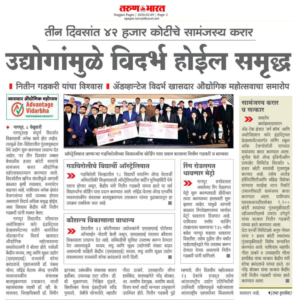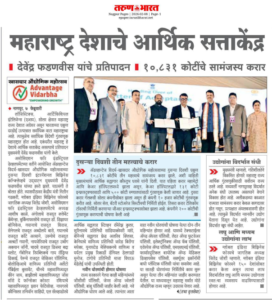EARLY DAYS
Nitin Gadkari Biography
Nitin Gadkari was born on 27th May 1957 in a Maharashtrian family with roots in agriculture in the orange-city Nagpur.
Gadkari’s mother left a huge influence on his life.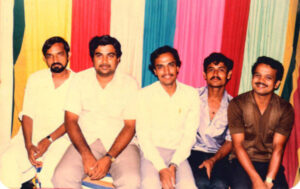
He imbibed and always practiced his mother’s kind-hearted and philanthropic nature of helping the needy even if it cut a hole in their modest resources.
By the mid-seventies the optimism of the early years of Independence was replaced with disillusionment. Disenchantment was building up among various sections of the society. The imposition of Emergency in 1975 only precipitated the angst of a betrayed populace. The extent of excesses carried out by the government then, shook Gadkari out of his comfort zone. As a student, he aggressively campaigned against the Emergency.
Gadkari got involved very closely with the Rashtriya Swayam Sevak Sangh (RSS) and the Akhil Bharatiya Vidyarthi Parishad (ABVP) and took to social work in a big way. He was particularly inspired by the RSS founder K. B. Hedgewar’s ideals of Humanity and Nation Building.
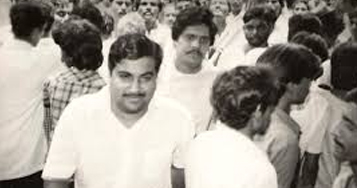
TURNING POINT
The Emergency, in many ways, was a turning point in Gadkari’s life. His active participation in politics began during those days and the march continues. While being active in student politics, Gadkari completed his Post-Graduation in Commerce, besides studying Law and obtaining a Diploma in Business Management.
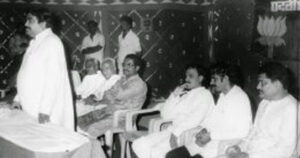
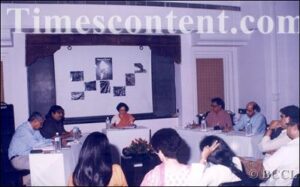
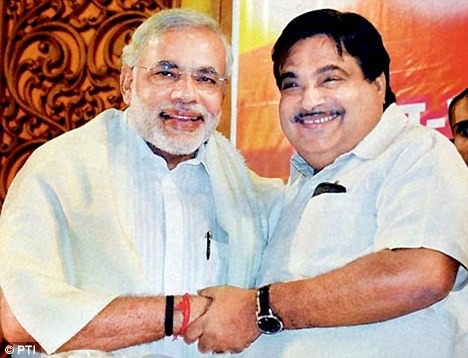
MISSION ANTYODAYA
An endearing feature guiding Nitin Gadkari’s political life has been to improve the life of the underprivileged through Antyodaya. The Antyodaya stands for eradication of abject poverty, provision of basic necessities to every family and ensuring that the last person in society gets the first opportunity to rise in life. This is what Swami Vivekananda, Mahatma Gandhi, Deen Deal Upadhyaya and other saintly figures had emphasized, and Gadkari pursues this principle diligently in his political life. Mahatma Gandhi’s principle of trusteeship and Pandit Deen Deal Upadhyay’s concept of Integral Humanism as philosophies have deeply inspired Gadkari’s thinking.
As a true practioner of Antyodaya with proven track record, Gadkari launched and promoted several projects for the welfare of landless labour, small and marginal farmers, tribals in left wing affected areas , in the field of education, healthcare, water conservation, agriculture, including opening of Ekal Vidyalayas, one teacher schools in the tribal districts of Vidarbha, and organised more than 1500 heart operations, transplant of artificial limbs for differently able people, sickal cell eradication programme, and encouraged tribal and rural handicrafts, bamboo craft, organic farming and bio-fuel
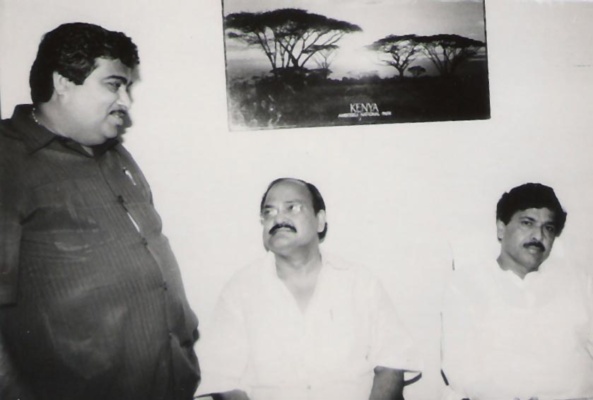
STINT AT GOOD GOVERNANCE
The first opportunity to realize Antyodya through good governance came Nitin Gadkari’s way in 1995 when he became Minister of the Public Works Department of Maharashtra.
Gadkari soon realized that Antyodaya could be realized only through road connectivity with the most backward villages of the country. During his tenure as PWD Minister of Maharashtra, apart from undertaking and executing several challenging projects, Gadkari was able to deliver a solution to the vexed problem of funding that confronts most infrastructure projects in our country.
His tireless efforts resulted in 98% of the total population of Maharashtra getting all-weather road connectivity in a record four years’ time. That included 13,736 remote villages. All this helped in containing the malnutrition problem among the tribal population in the Vidarbha region.
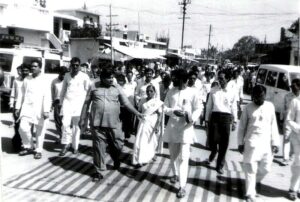
The agrarian reforms Gadkari introduced in Maharashtra including water conservation, organic farming and encouragement to bi-fuel and several other farmers’ welfare projects in healthcare and agro-based small and cottage industries brought down cases of farmers’ suicides.
Given how meagre the annual budget of the Ministry was, the task might have remained elusive had he only depended upon the allotted allocations. His Innovative and out-of-the box thinking helped in mobilising the funds necessary for the purpose.
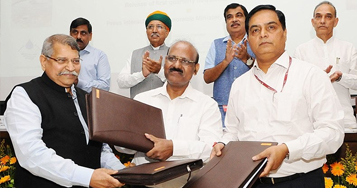
INNOVATIVE IDEAS
Gadkari’s quest for solutions led him to adopt the PPP (Public Private Partnership) model popularly known as BOT (Build Operate Transfer), for executing several development projects. This concept was instrumental in making the Mumbai-Pune Expressway and 55 flyovers in Mumbai, a reality, in record time. Later the same model was employed elsewhere into what we see today as “Golden Quadrilateral” and many more projects by NHAI (National Highway Authority of India. It also helped to release huge amount of budget funds earmarked for such roads, to be utilized for rural road development.
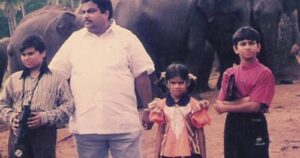
All the projects were carried out with utmost transparency, adhering to the highest standards of integrity and without compromising on quality. In fact, the Bandra-Worli sea-link was conceived during Gadkari’s tenure and was meant to cost over Rs. 400 crores. Unfortunately by the time the successive governments finally completed it, the cost had escalated by four times.
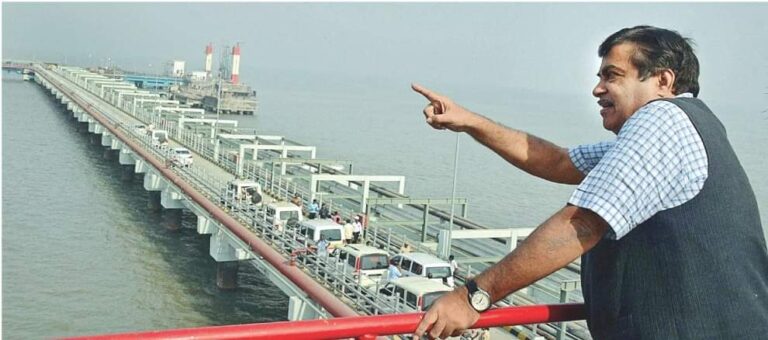
A VISIONARY
His impeccable credentials as a doer and a go-getter and the nickname “Flyover man” prompted Gadkari to present before the then Prime Minister Shri Atal Bihari Vajpayee a blue print of a nationwide rural road development project popularly known as “Pradhan Mantri Gram Sadak Yojana” which the first NDA government implemented to provide last-mile connectivity to the remote rural areas throughout the country.
Vajpayee also asked him to calibrate in shaping the successful National Highways Development Project (NHDP) of the NDA government.
Gadkari was elected to the 16th Sabha from Nagpur winning by an impressive margin. On 26th May 2014, he was sworn in as the Minister for Road Transport, one of the senior most members of the Narendra Modi government, is seen as a man of the masses, an accomplished social reformer, a skillful and a seasoned politician. Gadkari has earned for himself the distinction of being a visionary thinker and deft executor.
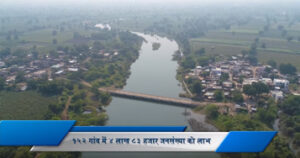
Building Safer, Smarter & Sustainable Roads
Under Gadkari Ji’s supervision, over 91,287 kms of National Highways have been constructed in the last 7 years and 30, 0000 kms of new roads are being constructed currently. Twenty two world class access-controlled Greenfield expressway projects being led by Mr Gadkari under Bharatmala pariyojana phase-1, are presently in various stages of construction. He is the man behind marvelous engineering showcases like Bandra-Worli Sea Link, 55 flyovers in Mumbai, India‘s First Mumbai-Pune Expressway, 14-lane Delhi-Meerut Expressway, Nagpur’s multi-layer metro rail cum flyover system and upcoming high-tech Delhi-Mumbai expressway.
Gadkari Ji has made it its mission to implement a transport fuel which is import-substitute, cost effective, indigenous and pollution-free. He also emphasized on adoption of
Building Safer, Smarter & Sustainable Roads
Under Gadkari Ji’s supervision, over 91,287 kms of National Highways have been constructed in the last 7 years and 30, 0000 kms of new roads are being constructed currently. Twenty two world class access-controlled Greenfield expressway projects being led by Mr Gadkari under Bharatmala pariyojana phase-1, are presently in various stages of construction. He is the man behind marvelous engineering showcases like Bandra-Worli Sea Link, 55 flyovers in Mumbai, India‘s First Mumbai-Pune Expressway, 14-lane Delhi-Meerut Expressway, Nagpur’s multi-layer metro rail cum flyover system and upcoming high-tech Delhi-Mumbai expressway.
Gadkari Ji has made it its mission to implement a transport fuel which is import-substitute, cost effective, indigenous and pollution-free. He also emphasized on adoption of Green Hydrogen as a clean and indigenous source of energy across various industries and mobility sectors. Recently, Gadkari Ji launched a car in Delhi, on pilot basis that is run purely on hydrogen. Road safety has always been and continues to be, even in the second term of the NDA government, very close to Gadkari’s heart. Steps taken by Shri Gadkari and his team of dedicated officials to realize this commitment included a new comprehensive Highway Capacity Manual and the successful enactment of a world class Road Safety Act, a new law passed by both houses of Parliament.
as a clean and indigenous source of energy across various industries and mobility sectors. Recently, Gadkari Ji launched a car in Delhi, on pilot basis that is run purely on hydrogen. Road safety has always been and continues to be, even in the second term of the NDA government, very close to Gadkari’s heart. Steps taken by Shri Gadkari and his team of dedicated officials to realize this commitment included a new comprehensive Highway Capacity Manual and the successful enactment of a world class Road Safety Act, a new law passed by both houses of Parliament.
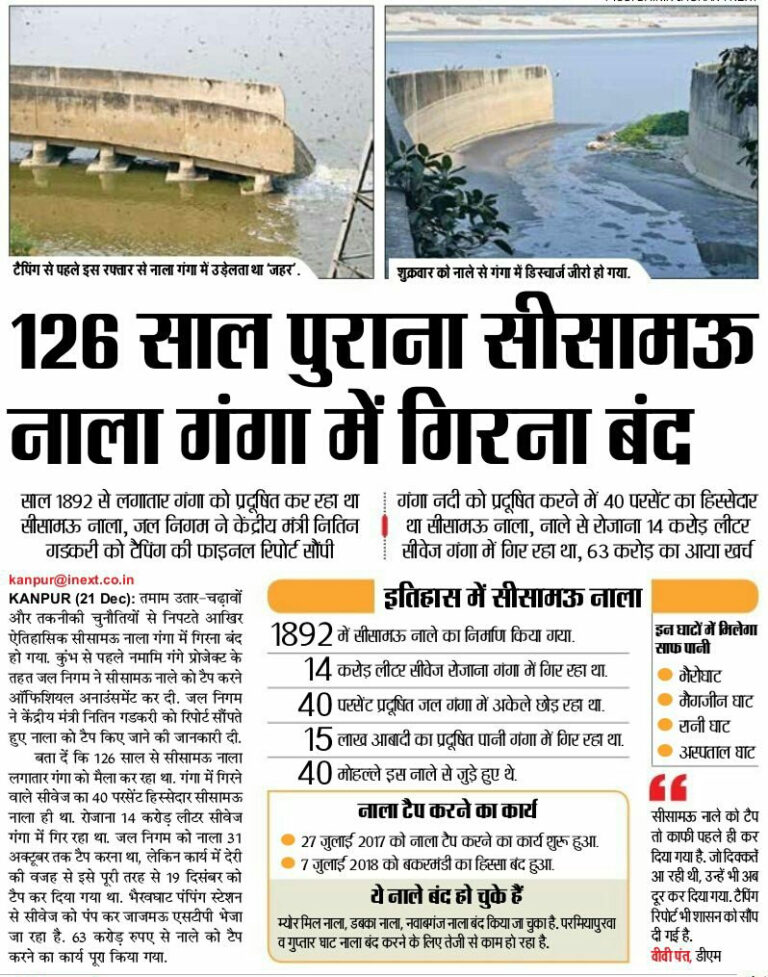
IMPETUS TO PROGRESS: SERVICE TO MAA GANGA AS WATER RESOURCES MINISTER
Nitin Gadkari, a man on the move, has been consistently engaged in accomplishing PM Narendra Modi’s dream of building “A New India”.
Some of his successfully ongoing innovative initiatives include port-led development under the Sagarmala programme around India’s huge coastline, a robust commissioning of Inland Waterways in rivers across the country, according highest priority to the National Mission for clean Ganga.
He is credited with achieving fastest highways construction rate, taking it from 3 km/day in 2014 to 30 km/day under Bharatmala, an ambitious world-class road and highways network.
Gadkari formally entered politics in 1980 , initially through a stint with the BJP youth wing Janata Yuva Morcha and later as BJP leader in Vidarbha and also served as PWD Minister in BJP-Shiv Sena government in Maharashtra during 1995-99. He was leader of the opposition in the state Legislative Council for four consecutive terms and rose from a grassroot worker of the BJP to a national level leader.
He became BJP’s State President in Maharashtra in 2005 and was elevated to the post of party’s national president at the young age of 52 in 2009.
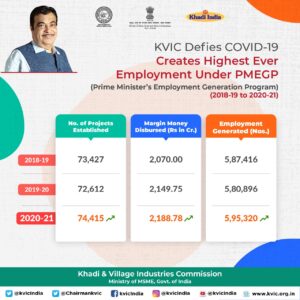
As the Union Minister for MSME Nitin Gadkari has already reached out to all the stakeholders and rolled out a host of welfare schemes for emancipation of the lesser-paid artisans and daily wagers in the cottage & village industries who have been preserving India’s traditional arts and its cultural heritage across the country.

